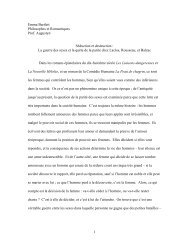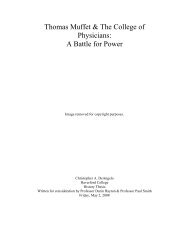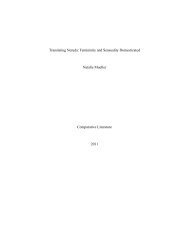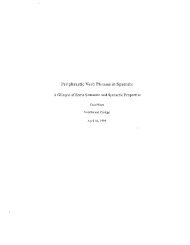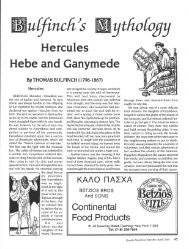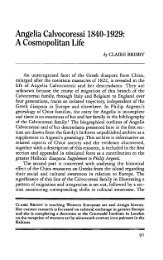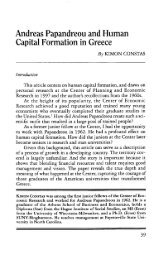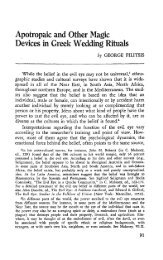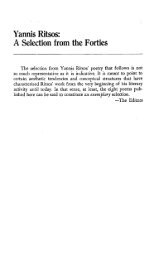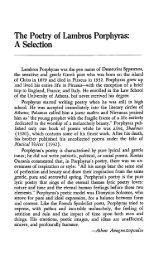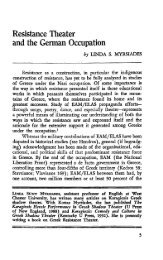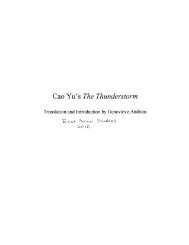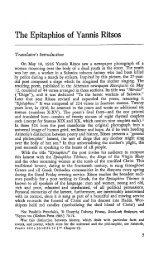Mythistorema - Triceratops Home
Mythistorema - Triceratops Home
Mythistorema - Triceratops Home
Create successful ePaper yourself
Turn your PDF publications into a flip-book with our unique Google optimized e-Paper software.
70<br />
JOURNAL OF THE HELLENIC DIASPORA<br />
to that of poem "10," in which the protagonists live by the shore, longing<br />
for the sea but unable to realize the journey. Here, however, the fate<br />
of the protagonist is even more tragic as he is chained to a rock with<br />
the sea in front of him. In addition, the sea, which symbolizes the inexhaustible<br />
love, is deadly for him because it hides the monster which is<br />
about to devour him.<br />
21<br />
Poem "21," along with "22" and "23," illuminates the connection<br />
between the epigraph of <strong>Mythistorema</strong> ("Si j'ai du goat, c'est n'est<br />
gueres/Que pour la terre et les pierres") and the whole sequence, by<br />
emphasizing the poet's belief in tradition. The symbolic journey of love<br />
cannot be realized since the protagonist accepts his gradual death—the<br />
decline of the senses—as just, because of the hubris he has committed.<br />
The poem can be seen as a spiritual return of the protagonist to the past,<br />
establishing a communication with the ancient dead.<br />
Poem "21" should be considered as a continuation of the idea partly<br />
developed in poem "18," in which the protagonist regretted the waste of<br />
love and reproached himself for it, although the later poem takes a very<br />
different turn.<br />
The sinking into stone presented in poem "18" turns into agony in<br />
poem "20"<br />
These stones which are sinking into the years, how far will they<br />
drag me with them?<br />
But here in "21" there is a certain compensation. In "22" there is a<br />
search for identity, a process of losing and finding again a road, and<br />
only in "23" is there a longing to "rise just a little higher," a frail dream<br />
which, however, considering the way <strong>Mythistorema</strong> ends, seems not to be<br />
realized.<br />
The sinking into stone in poem "18" and also in this poem is a<br />
gradual death—a "dying upright on our feet," as we are "Made one in<br />
the brotherhood of stone." However, the protagonist here says that he<br />
forgot his suffering, his unhappiness, for a while; he was able to go<br />
beyond his personal drama and express an acceptance of his fate and of<br />
the laws of justice that govern life and death. The expression "We forgot<br />
ourselves" is crucial in this poem because it implies that the protagonist<br />
forgot his solipsistic world and could perceive the just order of things<br />
in the universe. Seferis does not mean this here in the Christian sense—<br />
denying this life for a life after death—but in the pagan classical Greek<br />
conception, according to which life is a precious gift that can be lost<br />
irrevocably if one violates the laws of nature that keep the world in



